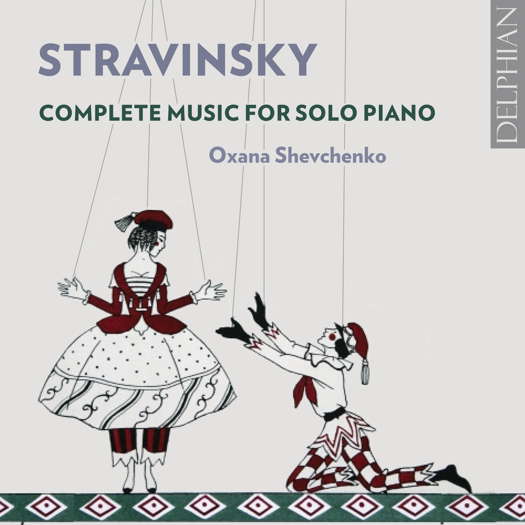 DISCUSSION: John Dante Prevedini leads a discussion about Music and the Visual World, including contributions from Celia Craig, Halida Dinova and Yekaterina Lebedeva.
DISCUSSION: John Dante Prevedini leads a discussion about Music and the Visual World, including contributions from Celia Craig, Halida Dinova and Yekaterina Lebedeva.


Idiomatically Revealing
Oxana Shevchenko plays Stravinsky for solo piano,
heard by RODERIC DUNNETT
'... finely and deftly played.'
heard by RODERIC DUNNETT
'... finely and deftly played.'
The first item on this scintillating disc is a transcription (by Guido Agosti) of three sections of Stravinsky's Firebird suite. Oxana Shevchenko, a young Kazakh who has collected a wealth of prizes (in the UK, Italy and Australia), and made her debut recital for the Delphian label, is something of a firebird herself. The fire actually courses all through the most revolutionary of Stravinsky's output, which (like Debussy) set the twentieth century on new paths. The bird is, conversely the lightness and enchantment of her singing lines, the way Shevchenko moves from pages of helter skelter a loving touch in softer passages.
She goes at the task with all the energy and drive of (say) Richter playing Prokofiev. There is no letting up in the drama here: she thunders, blazes and scampers in the evil Kashchei's violent Infernal Dance, then lulls us with the central Lullaby, and paces the famous culmination well-advisedly and splendidly.
And she effortlessly proves, as so often is the case, that the reduction of an impulsive and dramatic orchestral work for the piano can lead to a lucidity which, if played with refinement as here, actually clarifies the textures. You can hear the infinite detail of the basic material Stravinsky invariably evolved on the keyboard before he turned to orchestrate.
Her Tango is light-stepped, not bombastic, and that fits this expressive and essentially elegant dance ideally: it's a reading that is deft, prancing and witty. Ragtime is of course one of Stravinsky's most popular keyboard pieces. She also keeps its general demeanour soft, punctuated by periodic outbursts, while never failing to underline its dancing, syncopated preoccupations, mostly unveiled over a kind of ostinato falling fourth in the bass.
Listen — Igor Stravinsky: Ragtime
(CD1 track 5, 3:41-4:43) © 2018 Delphian Records Ltd :
The Valse pour les enfants, improvised for young readers of Le Figaro newspaper, is blithe, charming and short - and indeed playable by any child of even limited talent. More challenging, unsurprisingly, are the four Etudes, surely somewhere in line of descent from Scriabin and before him, Schumann or Chopin.
No 2, Allegro brillante, gives a perfect opportunity for Shevchenko to display her dizzying helter-skelter talents and phenomenal accuracy:
Listen — Igor Stravinsky: Allegro brillante (Four Etudes Op 7)
(CD1 track 8, 0:00-0:48) © 2018 Delphian Records Ltd :
The last section, Vivo, is similarly fiery, indeed even more so. It is preceded by a brief Andantino of exquisite charm, building to an almost mysterious exit. The Circus Polka for a young Elephant naturally owes something to Debussy, but its cheeky impudence is equally akin to Les Six - Poulenc or Milhaud, notably. Our elephant has a surprising light-stepped central passage: is it dancing on its toes? And then comes a virtual 'swing' passage, which builds again into something more elephantine, blustering and suddenly silenced.
Why Les cinq doigts? This is another work for children, eight short pieces which Stravinsky has crafted as an exercise using only five fingers. The opening Andantino is enchanting, and the Allegro patently re-examines in clever ways, as do some later parts, the same material; but it is when we get to No 3, the Allegretto, that we see the composer has not lost his identity: here the unmistakable Stravinsky peers through. Larghetto is a waltz-cum lullaby, the Moderato simpler in concept. Lento has a repeating bell-like feel, contrasting with the rest. The Vivo is outwardly for the brighter, more advanced child, but Stravinsky keeps it short: a brave youngster could essay it. The final Pesante Shevchenko keeps restrained: it's probably best that it doesn't overwhelm.
Piano-Rag Music is more demonstrative, perhaps less appetising, than Ragtime, but trips along nonetheless; while the concluding Scherzo on this first disc scarcely merits the name. It's at most an Allegretto, and could belong to the children's pieces above, being, as the notes say, an unremarkable very early piece. The meat on this first disc is an eleven-minute Sonata, dating from 1924, launched by a finely calculated perpetuo moto - more skedaddling for Shevchenko to encompass with not just finesse but a consequent elegance as well.
Listen — Igor Stravinsky: I (Sonata)
(CD1 track 21, 1:51-2:49) © 2018 Delphian Records Ltd :
Along comes an almost exotically beautiful Bachian or Scarlattian slow movement, an Adagietto akin to Bach's French Suites, and exemplifying the twentieth century neo-Classical idiom which Stravinsky and others were then initiating and embracing.
Listen — Igor Stravinsky: Adagietto (Sonata)
(CD1 track 22, 0:52-1:38) © 2018 Delphian Records Ltd :
The three-movement Sonata's Finale is much more of a 'scherzo' than the work of that name mentioned above. These works with their sometimes virulent, or as often sophisticated thrust seem ready-made for Oxana Shevchenko to execute with her endless brilliance and poise, again displayed here.
It surely takes little imagination to envision how perfectly the delicacy and finesse of Petrushka might transfer to the piano. Here again, in a version the composer made for Artur Rubinstein, you can almost hear the orchestral version shining through. Three movements are included: 'The Russian Dance' laughs along, full of wit and charm. 'Petrushka's Cell' features those shifts of motion (and emotion) and shy stepping-patterns which characterise so much of this work, variously adapted right through to the end.
Listen — Igor Stravinsky: Petrushka's Cell
(CD2 track 2, 1:06-2:00) © 2018 Delphian Records Ltd :
Stravinsky himself is interestingly quoted (by Ivan Moody's notes): 'I was above all interested in the special sort of writing demanded by a work originally conceived for the piano.' And again, 'I tried to make of this Petrushka (ie the piano version) an essentially pianistic work ... without assigning to it in any sense the role of an imitator.' To what extent this was achieved, there is no doubt the transliteration is wonderfully designed for the solo instrument.
The movements progress in length, so while the first is almost three minutes and the second four and a half, 'The Shrovetide Fair' runs to nine. One minute in we hear a pre-echo of the melody that will provide the triumphant finale and which indeed builds from here.
'Souvenir d'une marche boche' could indeed be a descendant from Beethoven, and was paradoxically written to assist the cause of Belgian orphans. It's in marked contrast to the Sonata in F sharp minor, dating from 1903. The first movement (Allegro) is pretty much a footslogging exercise, though when it lightens, around seven minutes in, it is charm itself, a worthy successor to Chopin or, as is rightly said, an equal to Rachmaninov, with much of that nine years older composer's celebrated breadth and extension of melodic line.
Regrettably the heavy trudging resurfaces. The Vivo is a lighter affair, and again eases up midway to a surprisingly simplistic and childlike section, oddly predictable in its chording: no wonder Stravinsky soon sought new ways out. The same could be said for the Andante, though it does satisfyingly show how delicate and apt is Oxana Shevchenko's touch, and how throughout the disc she displays a marked gift for phased crescendo and subtly engendered subsiding or die-away. The final Allegro is a bit of an elephant's dance again, with pounding pace and an appealing celebratory feel.
Listen — Igor Stravinsky: Andante (Sonata in F sharp minor)
(CD2 track 7, 1:02-1:58) © 2018 Delphian Records Ltd :
Fragment des Symphonies pour instruments à vent à la mémoire de Claude Achille Debussy dates from 1920 when the French composer (1862-1918) was the subject of several memorials. Although arranged from Stravinsky's Symphonies of Wind Instruments it does indeed have a melancholy and grieving demeanour, apt for its subject.
Listen — Igor Stravinsky: Fragment ...
(CD2 track 9, 0:02-0:54) © 2018 Delphian Records Ltd :
The concluding Serenade is very satisfactory from all points of view. Its structure feels wholly secure, its invention is pleasing, its rightness for the instrument obvious.
Listen — Igor Stravinsky: Rondoletto (Serenade in A)
(CD2 track 12, 0:53-1:31) © 2018 Delphian Records Ltd :
It makes a very rewarding conclusion to this double disc, as idiomatically revealing as it is finely and deftly played.
Coventry UK



